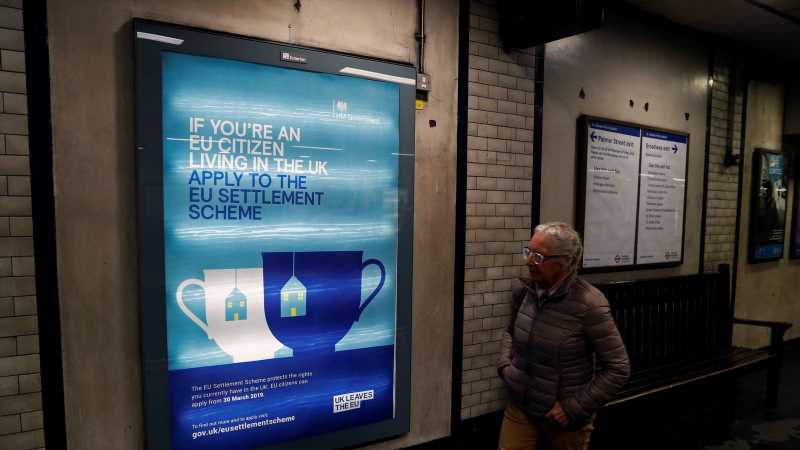The deadline for applications to the EU Settlement Scheme is at midnight.
Sky News explains what the scheme is, as well as what will happen once the deadline passes.
:: What is the EUSS?
With the Brexit transition period over and freedom of movement ended, EU citizens and their families have been asked to apply to the scheme, which launched in March 2019, so they can continue living and working in the UK.
People from the European Economic Area (EEA) nations of Iceland, Liechtenstein and Norway have also been asked to apply, as have those from Switzerland.
Family members also include non-EU nationals from those countries who are living with them in the UK.
Applicants must prove their identity, show they live in the UK and declare any criminal convictions to qualify.
Once they have been granted settled status, successful applicants can use the NHS, study and access public funds and benefits, as well as travel in and out of the country.
:: How many applications have been made so far?
The Home Office says that up to the end of May, 5.6 million applications have been lodged (5,605,800).
A total of 5.2 million (5,271,300) claims have been finalised, according to the department’s provisional figures.
Of these, more than 2.7 million (2,754,100) have been granted settled status, giving them permanent leave to remain in the UK.
Another 2.2 million (2,276,200) were given pre-settled status.
This means they need to reapply after living in the country for five years to gain permanent residence.
Of the remaining applications, 94,000 were refused, 72,100 were withdrawn or void and 74,900 were declared invalid – applications which the Home Office decided someone was not eligible to apply or failed to provide sufficient proof of residence.
:: What happens once the deadline passes?
Individuals who have yet to apply effectively lose their lawful immigration status.
This could stop them getting a new job or moving house until their status is confirmed as part of the scheme.
People will be able to submit applications once the deadline has passed, provided they meet the “reasonable grounds” for a late application.
These include:
• If a parent, guardian or council has failed to apply on behalf of a child
• A person has a serious medical condition which stopped them from applying on time
• If someone is a victim of modern slavery, is in an abusive relationship, is vulnerable or lacks the ability to make the digital application
• Other compelling or compassionate reasons, including in light of the COVID-19 pandemic.
Applications can be made years afterwards – if a child discovered later in life that they are undocumented, for example.
:: What about those who are still waiting to hear about their application?
An estimated backlog of 400,000 applications is currently being worked through.
It usually takes five working days for completed applications to be processed, but this can take more than a month if more details are required.
The Home Office has not committed to completing all applications by the deadline.
But the government has said that anyone who gets their application in by the deadline will have their existing rights protected, subject to the decision and any appeal.
Applicants will also be able to access a “certificate of application” during their wait for a decision, which they display to anyone that requires proof of their application – such as employers and landlords.
:: What will happen to those who do not apply?
Immigration enforcement officers will be handed powers to issue a 28-day notice to anyone they find who may be eligible for the scheme but cannot prove their immigration status.
This will tell them to urgently establish their lawful status by applying to the scheme.
The Home Office has said it will give people every chance to apply, but if individuals continue to fail to do so, the department has said they may be liable for enforcement action and will not be eligible for work, benefits or access to services like healthcare.
:: What happens now?
Campaigners say there are questions over exactly how many people are eligible to apply but have not.
In particular, they have raised concerns about the effect on vulnerable people, such as children in care.
And in the wake of the Windrush scandal and the Home Office’s hostile environment policy, some groups wonder if some people will be put off from making a late application to re-establish their legal immigration status to remain in the UK.
Concerns have also been raised about those who have been granted pre-settled status – and whether they will face difficulties when they have to renew their application.
Source: Read Full Article
